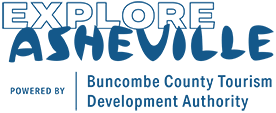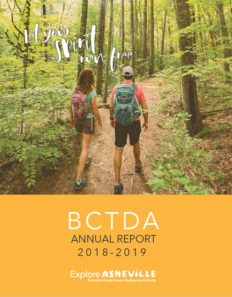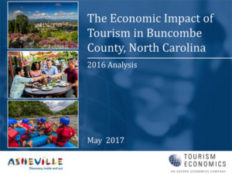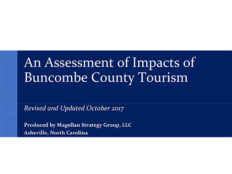VISITOR SPENDING AT LOCAL BUSINESSES
Visitors spend $2 Billion at local businesses in Buncombe County annually. Those businesses bought goods and services from more local businesses for a total economic impact of $3.1 Billion.
LOCAL TAXES GENERATED BY TOURISM
Tourism generated $199.1 million in state and local revenues in 2017.
In total, tourism generates $53 million in property taxes – 16% of the total property tax for Buncombe County and 1/3 of the total for the City of Asheville.
- City of Asheville: $27.9 million total, $20.6 million property tax and $6.2 million sales tax.
- Buncombe County: $63.1 million total, $32.4 million property tax and $28.7 million sales tax.
- State of North Carolina: $108.2 million total, including $73.7 million of sales tax.
PEOPLE WORKING IN TOURISM JOBS
Tourism in Buncombe County puts 18,346 people to work at tourism-related businesses. In total, tourism supports 27,241 jobs which is 15% of employment in Buncombe Count
- Tourism generated $840 million of employee wages.
- Every industry has entry-level positions. Hotels employ only 5% of the people in Buncombe County who earn less than $12 per hour.
- In 2017, hotels in Asheville paid 19% more than their counterparts on average in North Carolina.
- Tourism supports 4,812 workers in lodging, and:
- 2,673 retail workers (16.5 % of all retail workers)
- 6,142 restaurant workers (half of all restaurant workers)
- 2,895 jobs in recreation and entertainment (half of rec./ent. workers)
- More than 10,000 jobs in other categories including business services, finance, insurance and real estate
TOURISM PRODUCT DEVELOPMENT FUND
Through the TPDF grant program, $44 million of occupancy tax revenue has been awarded to 39 projects – many of them not possible without it. $22 million has been awarded to City of Asheville owned projects.
The TPDF has funded several infrastructure projects, including
- $7.1 million for City of Asheville Riverfront Redevelopment
- $22 million in total for City of Asheville owned projects
- $6 million to Buncombe County for the Enka Sports Complex
- $2.25 million for Town of Woodfin’s greenway/blueway
- $2.5 million Pack Square Park
- $5.675 million for US Cellular Center
MARKETING THE ASHEVILLE AREA FOR OVERNIGHT VISITATION
Lodging businesses provide 100% of the funding to attract visitors to Buncombe County. Every dollar spent on advertising generates $43 of spending at local businesses within just a few months of the campaign, and 75% of that spending is at non-lodging businesses including entertainment, recreation, attractions, retails, food and beverage, and the arts.
The occupancy tax is collected by lodging properties in addition to the sales tax.
FACING CHALLENGES TOGETHER
The BCTDA is a public authority with a public purpose that enhances the economic vitality of Buncombe County. Tourism is one source of growth that places demands on city services and infrastructure. Forty percent of downtown Asheville is occupied by uses that are not taxable. On a peak day in October, an estimated 25,000 overnight tourists visit Buncombe County while 45,000 non-resident workers commute into the city daily.
The BCTDA has committed to lead a process to collaborate with municipal and public entities to create a long-term strategy for investing Tourism Product Development Funds (25% of occupancy tax revenue) to address community needs within the legislative mandate of the Fund.
TOURISM BUILDS COMMUNITY
Tourism is essential to Asheville’s economic vitality.
The BCTDA’s investment in tourism promotion:
- Creates a customer base that sustains local businesses year-round
- Invests in community assets enjoyed by residents
- Generates awareness and reputation for Asheville that supports all economic development goals
Quality of Life Enhanced through Tourism Product Development
Many of the quality of life benefits to local residents provided by Buncombe County’s visitor economy have already been noted, but the BCTDA decided in 2001 to make a direct investment in that community quality of life through the creation of the Tourism Product Development Fund (TPDF). The TPDF is supported through a 1.5% occupancy tax and provides funding for bricks-and-mortar capital projects. Projects supported through this unique mechanism must generate new overnight visitation to the county—but local hoteliers are far from the only ones who benefit.






